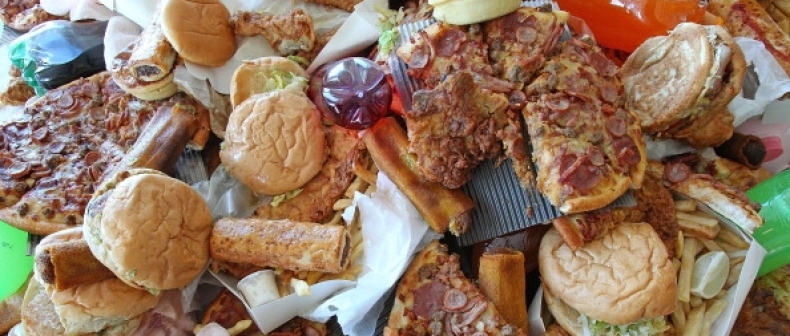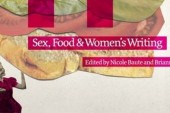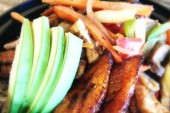
The Canadian public met its first nutrition label in 2003, and, as a country, we’ve gotten increasingly fatter ever since. Of course the food industry itself has changed, and continues to change everyday–antibiotics, growth hormones, preservatives, and pesticides now paint the food we eat on a daily basis. Modern health ailments started to plauge us in tandem with these changes, and we started to get fatter and sicker by the day. As our midsections expanded, so did the weight loss industry–both growing increaisngly plump. We then found a new acute hypersensitivity to food. Terms like gluten free, low fat, low calorie, low carb, sugar free, casein free, paleo, pescetarian, vegan, vegetarian, lactose intolerant, and alkaline infiltrated our minds and, like drool off a dog’s tongue in mid-August, started rolling off our tongues in thick globs. In its constant chase to the island of thin, the fashion world embraced all of the above with one arm open. The other arm was busy clutching a cold-pressed juice.
Following the trend of pubic control, Toronto’s board of health released new legislation recently. If passed, the legislation would require chain restaurants with annual revenue of over ten million dollars to display calorie and sodium content beside each menu item. And, while no one has made the claim that these two numbers will provide a complete nutritional profile, they have argued that the numbers would help consumers make more informed choices when eating at Toronto’s big chain restaurants. When contrasted against the restaurant industry’s feeble combative claims of opposition, this pro-legislation argument stands strong. More information should equal a healthier public consciousness. Yet if the last ten years of increased information and heightened rates of obesity and diabetes have taught us anything, it’s that this statement isn’t necessarily true. Instead of slapping numbers beside, on top of, and around the food we eat in hopes of producing an informed decision, perhaps it is time to re-evaluate our relationship with food entirely.
Today, the average person thinks about food at least 200 times per day. Occupying a large area of these 200 thoughts are our cravings– the foods we would like to have but know are ‘bad’ for us, along with the feelings of guilt and temporary satisfaction we’ve tied to them with Nutella ribbons. Also marking its territory in our 200 thoughts is what we won’t eat. Everything/anything-free diets are running rampant across plates everywhere as we’re consumed by thoughts of elimination, weight loss, and a constant chase to an undefined location– one requires us to be thinner than we are today upon arrival. The appreciation and gratitude that a meal requires to be enjoyed and savored has been largely exchanged for habitual eating and feelings of guilt and resentment both towards the food on our plates and towards the reflections we see when we look in the mirror.
While Vogue and Karl Largerfeld are easy to blame for what has turned into an unhealthy obsession with food, perhaps the real culprit lies somewhere between the world of stick-thin models and 3 a.m. trips to Taco Bell (what?). Today’s omnipresent nutrition facts have turned food into numbers and figures, which has stripped many of us of the ability to see food as a positive thing. Despite the new legislation, or the fact that one would be required to eat at chain restaurants regularly for it to have any measurable effect on health (which really is a much bigger problem), this consuming predicament of food and ‘nutrition’ obsession will continue to persist.
The fashion world is particularly guilty for its obsession with what it puts between (and leaves out of) its Tom Forded lips. We constantly look for the secret that will leave us thinner, because thinner must equal happier. One week we’re told it’s drinking Apple Cider Vinegar, the next it’s a juice fast, standing naked in a sub-zero room, after that it’s consuming a tablespoon of unfiltered raw coconut oil everyday. From calorie counting to vinegar swallowing, I have tried it all. After years of fad dieting and finding myself largely plagued by thoughts of food, I am slowly realizing the only sustainable solution to our modern ‘nutrition’ obsession is to find a healthy appreciation for food, stopping at least some of the food-related numbers from jangling in our heads.
Today’s increasingly strong association between figures and food will not restore our bulging inseams. Instead of being plagued by caloric values, sodium percentages, and carb-counts dictating what we can, can’t, and want to eat, or looking at food as a form of twisted punishment, we need to stop letting 200 daily food thoughts, and detailed numbers consume our minds. The diet industry continues to expand with our waistbands; our acute awareness has led to all-consuming thoughts, fad dieting, and binge eating.
While McDonalds’ lunch crowds and fashion types may appear to have nothing in common–the two demographics share 200 thoughts, thoughts that are swept under the rug and given time to breed together until they consume us in increments of Hidden Valley Ranch Sauce. While we cannot, all at once, drop our MyFitnessPal apps and run into a life not bound by food obsession, we can start to acknowledge its existence. Placing sodium and caloric values beside the menu items of large chain restaurants may seem like part of a solution to our overwhelming problem. Yet exiling some of our 200 daily thoughts feels like a more sustainable start. Maybe then we won’t find ourselves feverishly scooping heaps of McFlurry into our mouths to begin with.
____
Claudia McNeilly writes for Toronto Standard. You can follow her on twitter at @claudiamcneilly.
For more, follow us on Twitter @TorontoStandard and subscribe to our newsletter.














